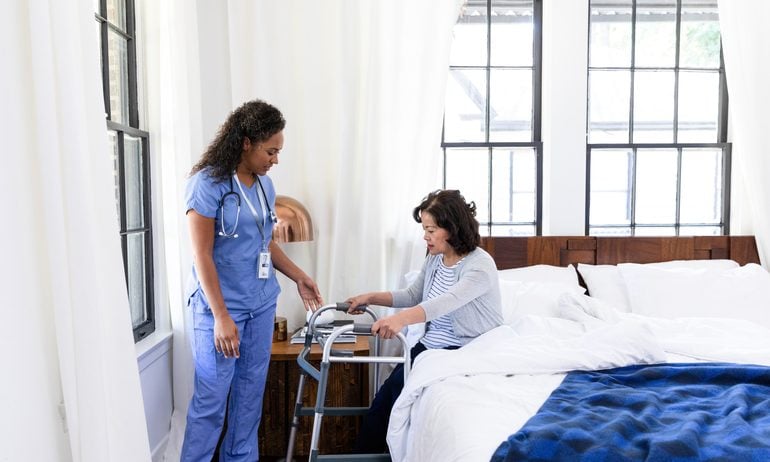Does Medicare Cover Home Health Care?
Home health care services are covered by Medicare for those who meet certain requirements.

Many, or all, of the products featured on this page are from our advertising partners who compensate us when you take certain actions on our website or click to take an action on their website. However, this does not influence our evaluations. Our opinions are our own. Here is a list of our partners and here's how we make money.
Medicare covers eligible home health care services, including home health aides and some therapies, if you meet certain requirements.
Home health care services refer to treatment for an illness or injury at home, including things like skilled nursing care and physical therapy. Depending on the circumstances, treatment at home can cost less and result in a better experience for the patient.
Shopping for Medicare plans? We have you covered.

3.95
CMS Star Rating
from UnitedHealthcare

3.63
CMS Star Rating
Medicare home health care coverage
Original Medicare covers various home health care services through Medicare Part A and Part B. Eligible services include:
Skilled nursing (part-time or intermittent).
Home health aides (part-time or intermittent, and only if you're also receiving other skilled services like therapy or nursing).
Physical therapy.
Occupational therapy.
Medical social services.
Speech-language pathology services.
Injectable osteoporosis medicines for women.
Durable medical equipment and medical supplies for home use.
These services are also covered by Medicare Advantage plans, which are offered by private insurers that contract with the federal government, though additional network restrictions may apply.
The following home health services generally aren't covered:
24-hour home care.
Personal/custodial care such as dressing, bathing or toilet assistance (if this is the only type of care you need).
Domestic services like cleaning, laundry or shopping.
Meal delivery. (However, some Medicare Advantage plans have started offering meal delivery for those in limited areas with certain chronic conditions after an inpatient stay.)
The parts of Medicare
Read more about the different parts of Medicare and what they cover.
Costs for home health care under Medicare
Original Medicare covers eligible home health care services at no cost to you if you meet certain requirements. For eligible durable medical equipment (wheelchairs, walkers, crutches, etc.), you’ll pay 20% of the costs after meeting your Part B deductible.
Some or all of that coinsurance may be covered if you have a Medigap policy, which provides supplemental coverage to Original Medicare. With a Medicare Advantage plan, additional restrictions and costs may apply.
The costs for home health services can vary dramatically depending on where you live. The national average cost of hiring a health aide was $27 per hour in 2021, according to the most recent Cost of Care Survey from Genworth, an insurance company.
Requirements for Medicare home health care coverage
To be eligible for home health services under Original Medicare, you need to meet certain conditions:
You must be under the care of a doctor. The plan of care you follow should also be established and regularly reviewed by a doctor.
Your doctor must certify that you’re homebound. This doesn’t mean you aren’t ever able to leave home — just that it’s very difficult for you to do so, or that you need special equipment or help to go out. You won’t lose eligibility for coverage if you venture out occasionally and briefly for doctor appointments or even nonmedical activities like religious services, a short walk or drive, weddings, graduations, funerals or family events.
Your doctor must certify that you need one or more of the following: Intermittent skilled nursing care (beyond drawing blood), physical therapy, speech-language pathology services or continued occupational therapy.
For physical therapy, speech-language pathology or continued occupational therapy services, the services must be deemed specific, safe and effective treatments for your condition and must be provided by a Medicare-certified home health agency. There’s also the expectation that your condition must be improving steadily and within an acceptable range of time, which is often about 90 days. If you’re not back to pre-surgery or pre-fall condition by then, Medicare may stop paying for treatments unless your doctor feels you will continue to improve with more time.
To determine eligibility, Medicare defines “intermittent” care as fewer than seven days a week, or daily for less than eight hours per day for up to 21 days. You may be able to extend beyond 21 days if your doctor can predict when your need for daily care will end.
The home health agency you're working with should tell you how much will be covered by Medicare before you start receiving services. If something won’t be covered by Medicare, the home health agency should give you an Advance Beneficiary Notice of Noncoverage, or ABN, which should include directions for filing an appeal if you wish.
How long you can receive home health services
For general home health services, you’re covered for as long as you’re eligible and your doctor recommends receiving those services. But skilled nursing care and home health aide services are covered only on an intermittent basis, which is defined as less than eight hours per day and 28 or fewer hours each week, once you’re receiving care. If you need services beyond intermittent skilled nursing care or home health aide services, they will not be covered by Medicare.




